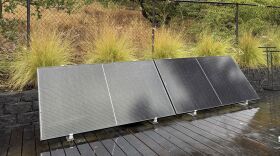Hū Honua Bioenergy and the Hawaiʻi Electric Light Company are in negotiations to revive an agreement to bring a controversial biomass plant into operation on Hawaiʻi Island.
On June 3, the companies submitted a joint letter to the Public Utilities Commission via their attorneys that expressed their intent to file a new application for HELCO to purchase power from Hū Honua's facility in Pepeʻekeo, a few miles north of Hilo.
Both Hawaiian Electric, the parent company of HELCO, and Hū Honua, also known as Honua Ola, confirmed the negotiations to HPR but declined to provide further details.
Whether or not Hū Honua's facility should be allowed to operate has been the subject of debate for over a decade.
How did we get here?
The PUC first awarded a power purchase agreement to HELCO for Hū Honua in 2012. But the utility later terminated that agreement, claiming that the energy company had missed key construction deadlines for its facility.
Hū Honua sued Hawaiian Electric, kicking off the first of several court battles between the two parties. (Hū Honua currently has an open lawsuit against Hawaiian Electric Industries in state court.)
After reaching a conditional settlement, HELCO and Hū Honua once again approached the PUC for approval to bring the biomass plant online in 2017.
The PUC initially granted that request, but then the environmental group Life of the Land appealed the decision, claiming that the PUC had not adequately taken the plant's climate impact into account in its decision-making.
Over the next five years, the issue bounced back and forth between the PUC and the Hawaiʻi Supreme Court until the PUC ultimately rejected the power purchase agreement in 2022, citing concerns about the plant's greenhouse gas emissions and the projected increase to Hawaiʻi Island customers' monthly electric bills.
The Hawaiʻi Supreme Court upheld the PUC's rejection in 2023.
The court ruling seemed like the final nail in the coffin for Hū Honua, and even those deeply involved in the saga were surprised to learn that the energy producer was once again in talks with the utility about a potential role on Hawaiʻi Island's grid.
"A lot of us within the industry had thought that this issue had been put to rest," said Jennifer Potter, who served as a commissioner for the PUC from 2018 to 2022.
Potter said the proceeding over Hū Honua's biomass plant was one of the largest she dealt with during her tenure at the commission, resulting in "thousands of pages of evidence."
Now, Potter said Hū Honua and HELCO’s joint letter seems to indicate that "the parties are attempting to start the process from scratch."
The PUC denied Hū Honua's last bid in a 2-1 vote. Potter, along with former PUC chair Jay Griffin, opposed Hū Honua's operations.
They have both since left the PUC. Commissioner Leo Asuncion, who issued a dissenting opinion, now serves as the PUC's chair.

Why was Hū Honua’s bid rejected in 2022?
Biomass energy, which involves burning organic matter like plants and trees to produce power, is considered a renewable resource under state statute.
However, Hū Honua's own estimates showed that its facility would produce more than 8 million metric tons of greenhouse gas emissions over the course of its multi-decade contract to provide power to Hawaiʻi Island.
Hū Honua has said that it would use eucalyptus trees growing on Hawaiʻi Island and other invasive species as feedstock, and then plant new trees to offset the emissions of its facility.
But Hū Honua's commitment to plant new trees was not legally binding, according to Potter.
In its 2022 decision, the PUC wrote that due to "speculation and uncertainty" around Hū Honua's plans for offsetting its emissions, there was a risk that the biomass facility "could become a net emitter of GHGs over its lifetime."
In an interview with HPR in 2022, Hū Honua President Warren Lee reiterated the company's commitment to be "carbon negative" and pointed to their agreement with the National Forest Foundation to plant over 3 million trees.
The other sticking point for the PUC at the time was that the plant was expected to displace other cheaper sources of energy, including renewables like wind and solar, and therefore raise customers' bills by about $11 per month.
Potter said that she will be looking to see if these concerns are addressed in the new power purchase agreement application.
"The ratepayers do not need to take on an additional burden for a plant that is emitting carbon emissions from burning trees," she said. "It seems like a double hit of pain for the communities that are in that area."
In a fact sheet provided to HPR, Hū Honua claims that its plant will "enable replacement of existing oil-fired fossil fuel power plants, resulting in improved air quality and a reduction in overall greenhouse gas emissions" and that its power will not be more expensive for consumers.
Life of the Land’s Henry Curtis was the first to call into question Hū Honua's climate impact. He said that issue is only more pertinent as the state approaches a major 2030 deadline to slash its greenhouse gas emissions.
"The idea that we're going to add a massive greenhouse gas producer to the grid just before 2030 seems absurd," he said.
Curtis said he is waiting for the new power purchase agreement to be filed to decide Life of the Land's next move. But he added that "certainly Life of the Land is not going to walk away from this."
Former Hū Honua neighbor now a state lawmaker
Amid the regulatory and legal back-and-forth, Hū Honua’s nearly complete biomass facility has sat dormant on the site of an old sugar mill in Pepeʻekeo.
State Rep. Matthias Kusch represents Pepeʻekeo. He toured the facility at Hū Honua's invitation last fall after he had been appointed to his position following the death of Rep. Mark Nakashima.

But Kusch's first dealings with Hū Honua occurred long before that. He said he used to live on and run an avocado farm about half a mile down the road from the biomass plant.
He said at the time, Hū Honua's operations raised a number of red flags for him, namely the added traffic from the facility's trucks on the community's narrow roads.
"I've had an opinion in the past that was very strong against Hū Honua," Kusch said.
However, Kusch emphasized that as a legislator, he will keep an open mind about the issue and take cues from his constituents.
Hawaiʻi Public Radio exists to serve all of Hawai’i, and it’s the people of Hawai’i who keep us independent and strong. Help keep us strong to serve you in the future. Donate today.







